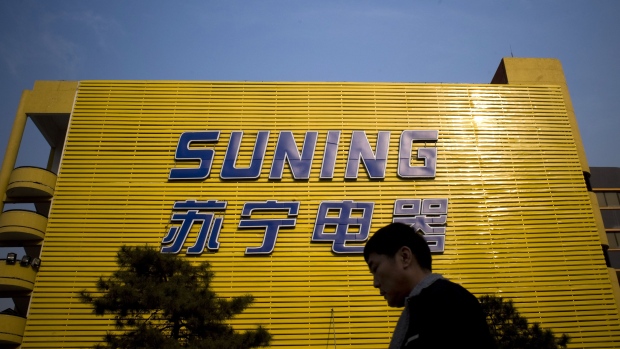Oct 27, 2023
China Retailer Suning Talks Debt Extension With Major Creditors
, Bloomberg News

(Bloomberg) -- One of China’s largest retailers, Suning Appliance Group Co., has proposed extending $6.1 billion of unsecured debt by eight years, in its latest effort to deal with a liquidity crunch.
Suning last month shared its latest proposal involving the 44.9 billion yuan of debt with an onshore creditor committee for discussions, according to people familiar with the matter who asked not to be identified as the information is private. The committee was established in September 2021 and has been working with the company on its debt load since, the people said.
An initial restructuring framework was presented by Suning to the committee in December 2021, according to the September document that described the company’s latest outline and was seen by Bloomberg News. A second framework was shared in November 2022.
Calls to Suning’s main line went unanswered Friday.
The group, founded in 1990, also has property and finance operations. Suning started to show signs of liquidity stress in late 2020, when founder Zhang Jindong waived his right to repayment of a 20 billion yuan investment from China Evergrande Group more than a year before China’s former top developer defaulted. His move, after Suning management previously said it planned to demand repayment, raised investor concerns about how the firm would be able to pay its own debt.
Zhang lost ownership control of publicly listed Suning.com Co. in 2021 as part of a state-backed bailout. His net worth has plunged to $345 million from $8.4 billion in 2020, according to the Bloomberg Billionaires Index.
Suning Appliance’s struggles highlight how liquidity woes for Chinese private-sector firms extend beyond the country’s ailing developers. China’s top economic planner said last month it’s creating a new department to help private businesses.
Suning’s latest proposal called for 90% of the 44.9 billion yuan in unsecured debt to be paid in five annual installments starting four years after enactment of a plan, according to the document seen by Bloomberg News. Most of those payments would be noncash like trust products, equity and assets.
The remaining 10% of principal would be paid over eight cash installments due Dec. 31 of each year, the document said. Two-thirds of that 4.5 billion yuan wouldn’t be received until years seven and eight.
©2023 Bloomberg L.P.





